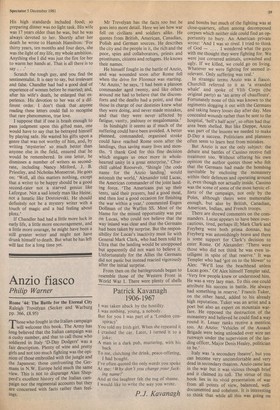Anzio fiasco
Philip Warner
Rome '44: The Battle for the Eternal City Raleigh Trevelyan (Secker and Warburg PP. 366, £13.95) Those who fought in the Italian campaign I will welcome this book. The Army has long believed that the Italian campaign was a cushy number, and that to call those who soldiered in Italy 'D-Day Dodgers' was a fair description. Plenty of wine and pretty girls and not too much fighting was the opinion of those embroiled with the jungle and the Japanese; those confronting the Germans in N.W. Europe held much the same view. This is not to disparage Alan Shepperd's excellent history of the Italian campaign nor the regimental accounts but they are concerned with facts rather than feelings. Mr Trevelyan has the facts too but he goes into more detail. Here we 'see how war fell on civilians and soldiers alike. He quotes from British, American, Canadian, Polish and German sources. He describes the city and the people in it, the rich and the poor, spies and collaborators, priests and prostitutes, citizens and refugees. He knows their names.
He himself fought in the battle of Anzio, and was wounded soon after Rome fell when the drive for Florence was starting. 'At Anzio,' he says, 'I had been a platoon commander aged twenty, and like others around me had to believe that the discomforts and the deaths had a point, and that those in charge of our destinies knew what they were doing, and never made mistakes, and that they were never affected by fatigue, vanity, jealousy or megalomania.'
In hindsight it seems as if much of the suffering could have been avoided. A better planned, commanded, organised stroke could have reached Rome soon after the landings, thus saving many lives and months. 'I thank God for this fine decision which engages us once more in wholehearted unity in a great enterprise,' Churchill cabled Roosevelt. 'Shingle [the code name for the Anzio landing] would astonish the world,' Alexander told Lucas, the American commander of the joint landing force. 'The Americans put up their tents, said their prayers, had a good meal, and then lost a good occasion for finishing the war within a year,' commented Eugen Dollman of the Waffen SS. Most of the blame for the missed opportunity was put on Lucas, who could not believe that the way inland was clear and that the Germans had been taken by surprise. But the responsibility for Lucas's inactivity must lie with General Mark Clark, who had been told by Ultra that the landing would be unopposed but apparently did not want to believe it. Unfortunately for the Allies the Germans did not panic but instead reacted vigorously after the initial surprise.
From then on the battlegrounds began to resemble those of the Western Front in World War I. There were plenty of shells










































 Previous page
Previous page